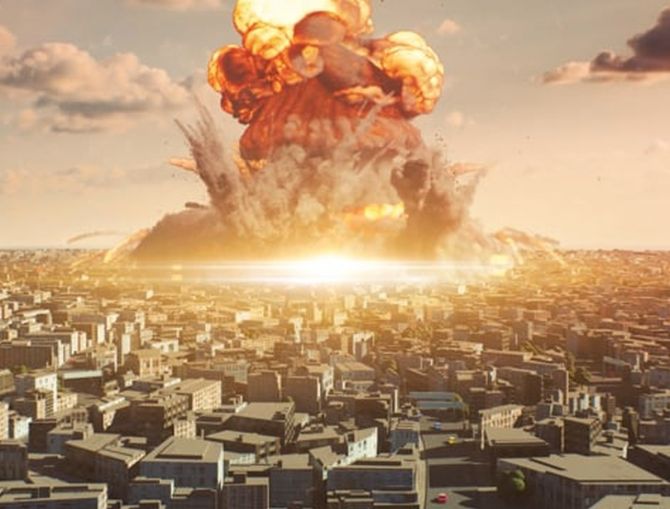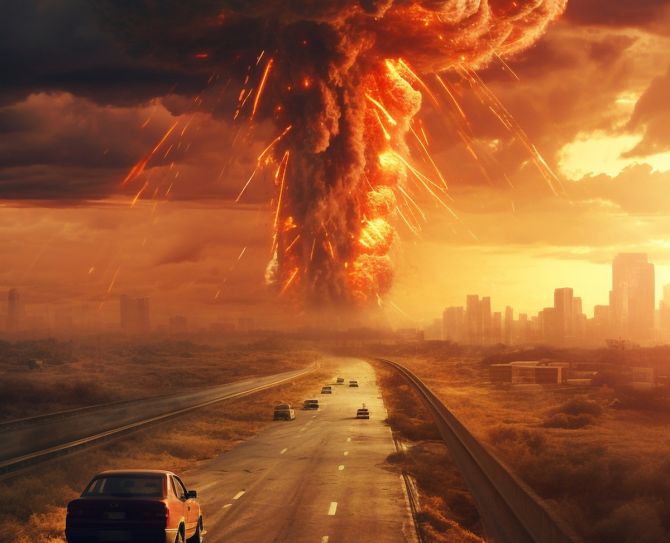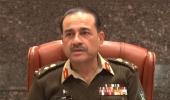A step away from nuclear weapons being used in conflicts, warns Colonel Anil A Athale (retd).

It is a convention that at the end of the year or the beginning of the new year one tends to write and think optimistically.
Even editors tend to ignore the gloom and doom stories during that period.
In India in particular, it is indeed the best of the season that is generally capped with the joyous Republic Day celebrations.
It is in deference to that time honoured tradition that I delayed writing on the grim dangers the world faces in the coming year.
2024 will see elections in nearly 60 countries.
This itself brings in a degree of instability to the world order, but is not a unique occurrence and has happened in earlier years as well. The difference this time is that the world order has changed to both an interlinked and multipolar model from the earlier superpower dominated world order.
In addition, there is the omnipotent presence of social media that amplifies news and messages that go viral at the click of a WhatsApp button.
What it means is there are repercussions of government changes in the neighbourhood as well as distant lands that were unthinkable a few decades ago. The change of government in tiny Maldives is a case in point.
More than the elections in 60 odd countries is the central fact that the contemporary world has become truly multipolar in the military sense.
The decline of the US as shown by its retreat from Afghanistan reinforces the trend of loss of control over world events.
While US power has declined, China, its closest competition, is nowhere near having the military reach that the Americans had in the past or the former Soviet Union had pre 1990.

Even during the Cold War, proxy wars or low intensity conflicts did take place - Vietnam, Korea, the Arab-Israeli wars and India-Pakistan conflicts come readily to mind. But all these conflicts were in limited geographies and except for the Middle East, in non-vital interests areas of the superpowers.
If the conflict in the sensitive Middle East seemed to go out of hand, the superpowers brought out the nuclear threat to bear upon and the wars were controlled.
India-Pakistan conflicts did have its local dynamics and to some extent independent of superpower meddling. But as in 1971, when India threatened the invasion of West Pakistan and its obliteration, the US sent in its Seventh Fleet to the Bay of Bengal.
In conflicts anywhere in the world, the superpowers drew the red lines and backed them with the threat of nuclear weapons, bringing these bush fire wars to an end.
The Cold War with massive nuclear arsenals did pose a danger to the world. But after the 1962 Cuban Missile Crisis, both the US and Soviet Union understood the risks, established hot lines and mutually agreed that nuclear wars can never be won and therefore should never be fought. This consensus lent stability to the world order.
In the aftermath of the Cuban Missile Crisis, President John F Kennedy is reported have said that he was lucky that he had to deal with only one nuclear power and shuddered to think how a future American president would deal with a situation where there are many nuclear weapon wielding powers.
The lesson of the Cold War is that the nuclear weapons can only deter other nation's nuclear threat. In conflicts below the nuclear threshold, they are of no consequence.
It is not just the absence of a Global Policeman that is causing conflicts the world over.
Proliferation of weapons technologies from missiles to drones has been the main cause. The improvised rockets used by Hamas was an eyeopener.

In the current Russia Ukraine war, Russia had to import drones from Iran. Ukraine was dependent on supplies from Turkey.
With multiple sources of weapons available, even the so-called proxies like Hamas in Gaza or Houthi rebels in Yemen are undertaking their own military operations.
While it may suit the politics of the US and the West to blame Iran or Russia for the attacks, the point remains that these organisations seem to have acted on their own.
There is very little military logic behind Iran supporting the Houthi rebels' attacks on shipping in the Red Sea.
On January 16, 2024, Iran carried out drone and missile attacks on Pakistan-based Sunni extremist group.
In retaliation, Pakistan used its air force to attack targets in Iran on January 18, 2024.
Tensions between the two neighbours are indeed old, but there was no triggering event like the Pulawama attack in India that led to Indian air strike on the Balakot terror camps in February 2019.
The almost casual way these attacks took place ought to be a warning sign that nations are becoming increasingly trigger happy.
In 1962 when international negotiations for increasing world trade began, pushed by economist John Kenneth Galbraith, the idea was that increased world trade would lead to international peace.
The World Trade Organisation was established in 1995 and has been at the forefront of the globalisation of the economy and an increase in trade.
Contrary to the vision of early pioneers, the WTO has been sabotaged by the US and the West with frequent economic sanctions to achieve their politico-military objectives.
With sanctions against Iran and Russia and restrictive trade practices against China, the whole exercise has become redundant.
Too frequent use has made economic sanctions a blunt weapon and not achieved its political aims. It has undermined the open trade regime and further fragmented the world.
The final nail in the peace coffin is the ineffective United Nations. An organisation that is frozen in time, reflecting the power equations of the 1940s, cannot be expected to cope with the challenges of the 21st century.
The world again resembles the map of the power balance in 1914 on the eve of the first world war.
Historians are unanimous that WWI took place in a multipolar world when none of the major powers wanted conflict. A small bush fire led to an inferno.
Like then, this time too, there is a declining power (the US), a rising power (China, like Germany then).
In addition, in the new found freedom to act, many nations or insurgent groups are intent on correcting historical wrongs. Without moderation it can easily degenerate into revanchism.
If the world is to navigate through these difficult times, it urgently needs a reformed and effective UN and sage world leaders who can lead a world peace movement.
The world is only a single step away from disaster, a step away from nuclear weapons being used in conflicts.
This can open the doors to a hell that mankind has kept away since 1945, when J Robert Oppenheimer recited the shlok from the Gita, 'Radiance as if a thousand suns have risen. And I become the shatterer of the world'
Colonel Anil A Athale (retd) is a military historian whose earlier columns can be read here.
Feature Presentation: Rajesh Alva/Rediff.com










